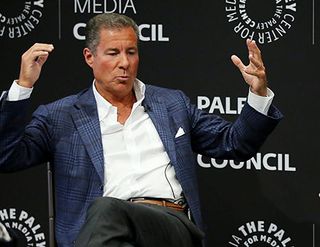Plepler: Less Than 1% of HBO Now Subscribers Cut Cord

Walking the tightrope of promoting HBO Now but also emphasizing the company’s strengths without the stand-alone OTT service, HBO chief Richard Plepler said the network’s talent relationships remain its secret weapon.
“That’s the secret sauce: who’s coming in” to pitch shows, he said. “Every week, I get a phone call saying, ‘So-and-so is here with the following idea.’ And the previous Sunday, you could not have imagined that the idea was real.”
In a Paley Media Council conversation with CNN’s Brian Stelter, Plepler pointed to the buzz HBO got from Beyoncé’s “Lemonade” video premiere; the emergence of once-left-field hits like Game of Thrones, Veep and Girls; and upcoming daily content from Jon Stewart and Vice. While the latter, plus Bill Simmons and Sesame Street, are ticketed for HBO Now, Plepler noted that “less than 1% of subscribers” to traditional bundles including HBO have cut the cord and opted for HBO Now.
“It’s really part of a cord-never environment and we’re simply making it available to them,” he said. “We think it’s additive” to MVPDs as well, he added. “We haven’t seen any cannibalization.” Securing positions on Hulu’s planned skinny offering or YouTube’s reported one is something the company will look at, but isn’t committed to at this point, Plepler said. “To the extent that a thousand flowers are blooming … that’s good news for content providers.”
Asked if he’d consider bulk-releasing a show as Netflix and SVOD rivals do, he said, “We’re going to be a little cautionary on that.” Had a slow burn like The Jinx been “dumped into the culture,” he argued, “you could make a strong argument that you’d detract from some of the joy” for viewers. Serialized releases also can benefit from publicity and social media, he added.
Plepler said Stewart’s show, which isn’t certain to premiere before or directly address the presidential election, will have short-form content that is “refreshed” four or five times a day. The production company Stewart is working with also specializes in animation, so the show will have some animated elements.
While the session was dominated by talk of new ventures, Plepler also made the case about how robust HBO’s underlying business is. He repeated a stat he is fond of: 20% of the 40-year-old company’s subscriber growth has come over the past four years. He also mentioned a corner of the business that’s far less sexy than OTT: the first TV window for theatrical movies. Viewing of movies is 78% of linear viewing and 64% of on-demand viewing. With supply coming from four major studios, there is a “delta” between HBO and rival networks.
Broadcasting & Cable Newsletter
The smarter way to stay on top of broadcasting and cable industry. Sign up below
Noting Stelter’s past career chapter as a New York Times reporter, Plepler cited a story the paper ran in September 2007 after he became co-president of HBO. It cited an expression that unnamed Showtime execs had taken to using, describing the premium net post-Sopranos and Sex and the City as “HBO-ver.” The article proved a catalyst for an eventual rebound. “I remember one of my first talks at the company, I said, ‘This is great, actually. We know what we have to do. And we know what we’re going to do. Let’s do what brought us to the dance in the first place, and that’s listening to insurgent voices that have something to say who we align ourselves with. And let’s make some bets and relax.”
The current environment, while not exactly identical, does include missteps such as A-list drama misfire Vinyl, launch numbers for HBO Now that have underwhelmed some Wall Street analysts, and the exit of Thrones in the not-too-distant future. As Les Moonves pointed out earlier in the week on the CBS earnings call, Showtime won the premium network ratings race in three of four quarters of 2015 (before Thrones returned this spring).
Plepler said the network’s response to the ups and downs and intensifying competition from Netflix, Amazon, FX and others is simply this: “We concentrate on playing our game… and we are always asking ourselves what’s next.”
